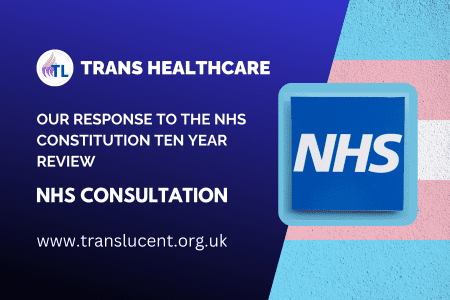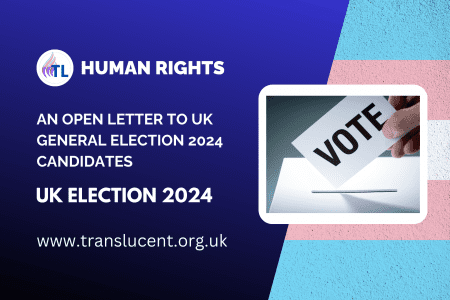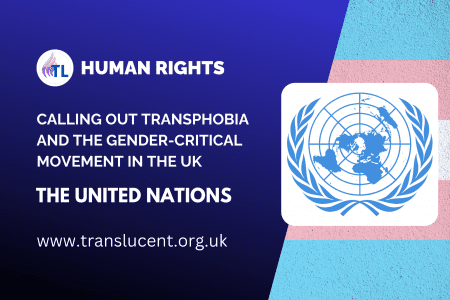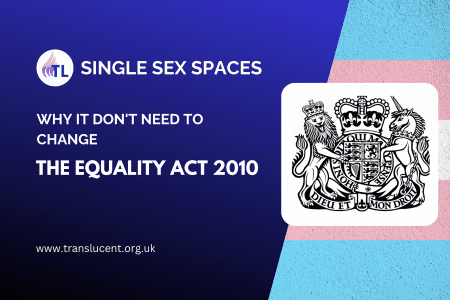Sadly, based on the evidence currently available, I would have to say yes – either unwittingly or deliberately.
But as anything trans-related in the UK goes – I don’t think it’s entirely that simple either.
This is a story that has many intersecting strands, and I would have to say that barring the release of additional evidence or Dr Brady himself being unequivocal and answering some very difficult questions that could well affect his career – we may never know the full, true answer.
I do want to state this before I start trying to unravel these events – Dr Brady is generally held in high regard among the trans community, and many who work with him either directly or indirectly have clearly stated he is a trans ally. He has worked within the LGBT sector for some time and is National Advisor for LGBT Health, Medical Director at Terrence Higgins Trust and a Sexual Health & HIV consultant at Kings College Hospital. He has a good track record and also sits on the NHS Gender Dysphoria Clinical Programme Board with the ‘Policy’ competence.
And in response to yesterday’s events, he stated he was committed to de-medicalising legal recognition for trans people. We will look at those last two points as we go through this mess.
Pink News breaks the story.
Yesterday’s events originate with a Pink News story, making the quite astonishing claim that Dr Brady effectively derailed GRA reform when both Liz Truss and Boris Johnson were ready to make some actual changes by dropping the requirements for medical diagnosis but leaving some medical aspects. That in itself seems…incredible.
However, the story actually originates back to a judicial review brought in Northern Ireland challenging the need for medical evidence in the GRA, the details of which were only released on the 13th May 2021. You can read the judicial review here. This legal case is worthy of an article on its own but needs substantial further research on the potential ramifications.
But in short, in this case, the UK Government provided evidence purportedly from Dr Brady, and in turn, that evidence was used to stop any meaningful reform.
Trying to make some kind of sense of it all.
To even try to unravel this, we first need to know who the key players are in this convoluted mess.
These are :
And the key understanding needed here is how both the current Gender Recognition Act requirements and the NHS diagnostic protocols for trans people (both 2013 and 2019) are designed to be intrinsically linked in a symbiotic relationship.
Put simply, GRA 2004 requires the following:
The NHS usually provide all three, with the first from a psychiatrist that has to be on a current, government-approved list (usually at the GIC), the second from the GIC / Surgeon, and the third from your GP.
What was used in the Judicial Review as evidence?
Essentially [59] onwards sets out the Government narrative that they were going to remove diagnosis from GRA but keep “some medical aspects”, but the pertinent aspects we need to look at can be found in sections [65] thru [69] and [80] thru [83].
In [66] it states :
‘It has become clear from our discussions with DHSC and the helpful insight provided by the National Adviser on LGBT Health, Dr Michael Brady, that removing the diagnosis of gender dysphoria while maintaining a medical aspect to this process would be an impractical step. For those seeking medical support to change their gender, the NHS would continue to provide a diagnosis of gender dysphoria or gender incongruence even if we removed this requirement from the GRA process.
The view of the DHSC and NHS England officials and advisors was that such a change would create confusion and uncertainty amongst clinicians, and so they do not currently support such a change…’
This means that both the NHS would continue to operate on a pathologising basis to access & deliver trans healthcare, and removing this from legal recognition would be out of step – citing ‘confusion’ among clinicians – and Dr Brady appears to support this.
Removing diagnosis requirements from the GRA would not have been “an impractical step” in a legal sense, but it would make the NHS position to continue with an abusive diagnostic practice completely untenable.
So what we have here is a complete moral abdication of any concern for the human rights of trans people and a complete reluctance to depathologise trans healthcare – not because it harms trans people, but because it might be more confusing for supposedly intelligent clinicians with years of medical training to stop providing a diagnosis and start treating trans people with some respect.
To make matters worse, [81a] states:
‘(a) The 12 May 2020 meeting note recorded the LGBT Health Adviser as saying that, “Gender dysphoria is the accepted terminology (although there is a move towards using gender incongruence).” He had not been advised by trans people that the diagnosis or label was stigmatising, but felt that the process overall was stigmatising and that the issue of stigma should be seen in that context. He further considered that it did not matter where the diagnosis was categorised (whether under mental health or sexual health): it remained a diagnosis but was not perpetuating a mental health stigma. The Adviser did not appear keen on assessing psychological readiness or ‘fitness to proceed’, the additions of which he considered would further medicalise the process and more intrinsically link gender recognition to medical treatment. Ultimately, he recommended “using the terminology that is used in the medical community, and that is gender dysphoria.” However, it is also recorded that he “wondered how the LGBT sector would receive this; though there would also be kickback from clinicians” (although it is unclear precisely what it was thought might give rise to the “kickback”).’
(highlights mine)
The statement that he hadn’t been told by trans people that the diagnosis was stigmatising frankly beggars belief, given that, was a key theme in the consultation that the government ran on GRA reformGRA Reform Gender Recognition Reform Bill - Scotland https://www.gov.scot/news/gender-recognition-reform-bill/ Published 03 March 2022 09:34 Part of Equality and rights Simplifying how trans people apply for a Gender Recognition Certificate. See Also https://mermaidsuk.org.uk/mermaids-manifesto-for-gra-reform/ https://www.stonewall.org.uk/what-does-uk-government-announcement-gender-recognition-act-mean , as well as a frequent topic of discussion and complaint in the community – as anyone who interacts with trans people on any basis, could easily attest. This is then apparently contradicted by acknowledging that the process itself is actually stigmatising.
Let’s get something absolutely straight here. Requiring a diagnosis which effectively medicalises your identity, whatever the process, is inherently stigmatising. You can’t separate the two unless you’re remarkably obtuse or under orders to differentiate it. If you really don’t understand that point, you’re not fit to represent the trans community in any capacity on healthcare.
It is then acknowledged that GRA & medical requirements are intrinsically linked by referencing “further medicalisation”. It would appear that a suggestion was made to add additional medical reports via “fitness to proceed” – which, yes would add an additional burden given that Dr Brady did not appear to want to change the existing processes.
Im not surprised there was concern about “kickback”.
Unfortunately, it’s then compounded further.
[81b] states:
‘(b) The 3 June 2020 meeting note records the LGBT Health Adviser as saying that he “thinks that when a medical element remains part of the GRA, the most and only logical one is the gender dysphoria diagnosis.” The DHSC officials were then going to write a submission to their Secretary of State. They thought that he “will not want to use his role to interfere in the medical diagnosis, and also not to change the wording in legislation (just because you don’t like the word).” From DHSC’s perspective, the key question was what the clinical implications of the change would be. If the 2004 Act required a medical process, then DHSC’s input should be fed into that; but the officials were to explore if and when the LGBT Health Adviser could play a role in giving clinical advice to the Ministers.’
(highlights mine)
So apparently, Dr Brady thinks a diagnosis should remain and was more concerned about the use of a phrase than the harmful nature of NHS provided trans healthcare.
If a medical element was still required, why was it not suggested that a GP letter simply detailing the fact that the trans person was undergoing or had undergone treatment sufficient?
Why push to retain the diagnosis element?
This judicial review shows that the decisions and advice around GRA reform are being made by policy makers who are not apparently keeping up with the contemporary medical understanding of gender dysphoria. Both ICD 11 and DSM V describe it as a result of incongruence and not a disorder – indeed, the DSM V goes to pains to point out it is not considered a mental illness.
But the GRA still requires a medical diagnosis currently; how can you have a medical diagnosis of something that isn’t a disorder?
There is a clear, fundamental difference between a disorder and people whose identities that do not conform to the cultural enforced binary benefiting hugely from modern medical treatment in order to survive in such a society and thrive within it.
And it also highlights the severe problems caused by having cisgender run; cisgender led and cisgender decided trans healthcare and relying on cisgender representation in order to advance changes.
It looks pretty damning, especially when you consider that if it wasn’t for this judicial review, this information would never have seen the light of day.
Conflict of Interest?
Here’s where it gets interesting and more convoluted.
Dr Brady apparently provided this advice as the National LGBT Advisor during 2020.
This role was created and paid for by the UK Government but has been taken over and funded by the NHS – as he himself stated in the evidence session to the Womens & Equalities Committee GRA Enquiry on 12th May 2021. The video of the full meeting is here, and Dr Brady participates in the second half.
I haven’t been able to pin down exactly when this switch in role funding occurred, but this may be a missing piece of the puzzle. Because as previously mentioned, he is also on the NHS Gender Dysphoria Clinical Programme Board under a policy competence.
So, was he being paid by the NHS when he apparently gave this advice to the Government, and / or in doing so, was he constrained by NHS policy in order to keep trans healthcare hard to access and deeply abusive? Has Dr Brady, who appears to have dedicated his life to being an LGBT ally, made statements and decisions that protect his employer even if they are fundamentally wrong and are incompatible with his personal beliefs?
It wouldn’t be the first time someone has.
The NHS / GRA Catch 22
Because what we may have here is a vicious catch 22 situation apparently being perpetrated by the NHS. As noted previously, both the diagnostic process and GRA requirements are intrinsically linked by design.
Consider this.
Solution : Change neither the Government and NHS win, and trans people lose again.
Further Evidence
Another aspect to consider that supports this assertion is that while the NHS is making great claims about the new Gender Dysphoria clinics – the diagnostic process they operate under (2019 protocols) is not much different to the one it replaces (2013 Interim Protocol) – and on paper at least keeps the same abusive assessment and diagnostic process.
The significant difference is how the new clinics, which are currently run by LGBT services, interpret these protocols – and they may have much more latitude in the pilot phase.
There is no guarantee that newer gender dysphoria services or those that replace the pilots should they not continue, will not be exactly as stigmatising as the existing GICs, because the diagnostic protocols continue to allow it – it is baked in.
Remember, Dr Brady sits on the NHS Board that instituted this protocol. And remember that according to the information in the judicial review, he appears to be opposed to depathologising trans healthcare provided by the NHS.
When we also look at his distinctly lacklustre performance at the Womens & Equalities Committee evidence session on the 12th May, it becomes clearer that he may be either explicitly backing or is constrained by the NHS on keeping trans healthcare as is – because that’s who pays his wages.
Now let’s look at the two statements published by the NHS and Dr Brady in response to the Pink News article.
‘To avoid any doubt: I agree with the majority of respondents to the GRA consultation that the requirement for a gender dysphoria diagnosis, a medical report, evidence of living in true gender for 2 years and spousal veto should be removed from the process.’
‘The statements attributed to me that were reported today are misleading and misrepresent my advice. The GRC process should be de-medicalised, simplified and barrier free.’
Let’s look at these initially because they differ from the NHS statement.
The first is a clear commitment to demedicalising the GRA. Personally, I believe this is true, but I also suspect that this is his view in a personal capacity, not in his professional capacity as an employee of the NHS.
Why?
Because he makes absolutely no commitment to significantly reforming trans healthcare provided by the NHS, what we have now, and what is coming are almost exactly the same.
The second requires further clarification – Is he saying that Pink News misrepresented him in the article, or is he saying that the UK Government misrepresented him in the court case? Because if so, that’s an even bigger bombshell.
The NHS statement says:
‘This story is incredibly misleading and misrepresents Dr Brady’s advice which was that gender dysphoria is acceptable wording if the Gender Recognition Act requires a medical diagnosis.
Dr Brady’s opinion is that, in line with the majority of respondents to the Government’s consultation on Gender Reform Act, the process for requiring a gender recognition certificate should be as seamless and barrier-free as possible.’
It should be noted that an image of this statement was posted in Dr Brady’s first tweet, but I haven’t been able to actually locate the statement itself online at the time of writing.
However, the NHS clearly blames Pink News, who, as far as I can see, simply reiterate what is attributed to Dr Brady in the judicial review.
It’s also extremely narrow, focusing only on the wording issue – completely ignoring everything else I’ve detailed above, all of which are major aspects to this story – which in turn implies that those statements are indeed truthful.
So what the hell is going on?
As I see it based on the available information, we have several likely scenarios.
Scenario 1 : The statements attributed to Dr Brady in the judicial review are accurate.
If so, this is deeply concerning, because it means the thrust of the Pink News article is true – Dr Brady completely derailed GRA Reform, and he has been less than truthful with the trans community.
Occam’s Razor suggests the simplest answer is usually the right one. The simplest answer here is that the advice given by Dr Brady to the UK Government was never intended to see the light of day. But that doesn’t line up with his track record or accounts by people who have worked with him closely, stating he is a trans ally.
It could be intentional under the aegis of NHS policy to keep trans healthcare pathologising and linked to GRA requirements, especially given the evidence that he is part of the board that has ensured trans healthcare is staying abusive, and both his and the NHS statements that only address narrow aspects of the article. This fits with the simplest answer.
I would also speculate that the NHS may be trying to keep trans healthcare as is because significant reform would mean a loss of funding.
However, it may have been unintentional.
Despite being an ally, he either may not have been fully aware of just how badly the trans community considered both the diagnosis and the diagnostic processes employed by the NHS, or he failed at getting that across. Combine that with ill-chosen words easily twisted.
But, some of the detail provided in the judicial review is a little too specific for this to ring entirely true.
Another possible angle is that the quotes are correct, but are out of context. This could mean that the questions that created the quotes were asked around a specific scenario or questions, but have been used in a general way or as answers to different questions. (Added 17/5, with thanks to Lisa)
Either way, the result remains the same – the UK Government used these statements to block GRA Reform, and Dr Brady and / or the NHS threw trans people under the bus.
Scenario 2 : The Government were untruthful in the judicial review evidence, and the statements are inaccurate.
If this is the case and it can be proved, then it is absolutely explosive.
To be clear , when I say untruthful I mean that the Government have either outright lied in the judicial review, left out context or misrepresented (lies of omission). (Added 17/5)
It means that the UK Government have deliberately scapegoated Dr Brady to blame him for derailing GRA reform and lied in court in order to justify binning reform through a crafted narrative. I can’t really buy that this trans hostile government actually had plans for reform, so this has a ring of truth given what we understand about the GEO, Liz Truss and the current UK Government.
If so, the judicial review should be reconducted at a minimum, the UK Government held to account, and Dr Brady exonerated. Lying in court is serious.
Some are speculating that this entire story may be to deflect from the upcoming ILGAILGA A driving force for political, legal and social change for LGBTI https://www.ilga-europe.org report of LGBT Rights in Europe due next week and the expected massive decline in UK ranking, which has dropped steadily from 1st to 10th over the last 5 years or so.
However, if defection was the aim, it would require a substantial amount of planning and foresight on the part of the UK Government, which, while they are fully capable of lying through their teeth, I would suggest is quite beyond their intellectual capabilities.
It would mean planning, forethought and timing the release of this information in collusion with the court in Northern Ireland in just such a way to use Pink News as an unwitting carrier – a position I find highly unlikely as it would be far easier to release via The Times as a hit piece – as has been done previously. They cant even time closing travel from a country with a highly virulent strain of Covid, putting the UK population at further severe risk.
However, now the information is out, I do think the UK Government are going to spin it this way, scapegoating Dr Brady regardless.
Conclusions, Considerations and Questions.
At the moment, we are left with an extremely muddied picture that paints Dr Brady in an extremely bad light, and leaves us with more questions than answers.
Personally, I suspect elements of both scenarios above are likely, and it’s clear the truth has been the first casualty.
However, it remains that there are a number of questions that only further investigation via Freedom of Information may reveal or that Dr Brady himself can answer.
These are all difficult questions, with no current answers – and only time may reveal the truth.
I will conclude this with an open offer to Dr Brady to clarify or provide answers to any of the above questions or points raised in this article if he is able to do so – in whatever format or via a personal chat. I sincerely, desperately want to be completely wrong on this. Because with precious few trans allies, we don’t need to lose any of the few we do have, and both I, and no doubt the rest of the community, would appreciate some actual truth and straight answers.
Update 19/5/21
I have been chatting with other, more connected figures within the LGBT community over the last few days regarding this.
You may remember about 18 months ago the NHS web page page on Puberty Blockers was changed to include erroneous, scaremongering information used by trans hostile activists – that little was known about them or their effects, and they are experiemental.
The contents of several emails I’ve seen show that while Dr Brady attempted to find out how this was done, and tried to help facilitate getting the web page changed back to it’s more accurate previous state – he was unable to do so. Indeed, it suggests that this intervention may have been blocked from higher up within the NHS.
While this is not conclusive and doesn’t exonerate Dr Brady, it stands to reason that if he was unable to influence changing a simple NHS web page, then he lacked the influence to single handedly derail GRA reform as indicated in the GEO materials in the judicial review.
This reinforces the hypothesis that Dr Brady is being used as a scapegoat, and that the GEO may have lied, either directly or thorugh omission or misrepresentation, to the court in the judicial review.
I have written directly to the Women’s & Equalities Committee regarding this matter, asking them to further investigate whether a conflict of interest, NHS policy or other factors explored in this article that have been raised by the judicial review may have been significan factors in reform being dropped, and am currently compiling a list of Freedom of Information requests that may help to reveal more information.
Update 22/5/2021
Late yesterday, Dr Brady released another statement to clarify some of the questions being asked in response to the information contained in the judicial review. You can find the statement here. If we take this statement as truth, and the only compelling reason not to is that Dr Brady works for the NHS advising in the area of trans healthcare, then this clears up a few questions, but shifts focus to others.
So, where does that leave us, and Dr Brady?
While the statement doesn’t completely exonerate him, it confirms that my original assertions were broadly correct – that these statements were accurate, made by Dr Brady in response to specific questions.
This shifts the balance of probability significantly towards the UK Government lying to the court by misrepresentation, and appeared to do so with the intent of deliberately undermining Dr Brady’s position within the LGBT+ community.
In effect my original assertion remains true – Dr Brady unwittingly helped to derail GRA reform.
However, the statement reiterates Dr Brady’s personal opinion in supporting GRA reform – but does not mention what the NHS position actually is – something that desperately needs to be clarified as a key point in this because as is clear in the judicial review [66], the NHS has absolutely no intention of changing the deeply pathologising nature of trans healthcare in the UK, and that is intrinsically linked with GRA requirements.
There is also obfuscating language used that still muddy the waters. Dr Brady’s statement (as does the judicial review), bounces between ‘medical diagnosis’, ‘medical element’, ‘medical assessment’ and ‘medical report’ – all completely different things that are being conflated as one.
We know from the statement that ‘a medical diagnosis and assessment was not going to be removed from the GRA’.
We know the NHS does not want to dispense with the need for a diagnosis, so that remains.
We know the NHS does not want to dispense with medical reports or assessments, so they remain.
So many original questions remain unanswered, and some new ones arise.
The statement also ends with an unnecessary dig at Pink News, who simply reported the contents of the judicial review. Yes, it caused anxiety, and justifiably so – but without this reporting, these events and Dr Brady’s involvement would never have seen the light of day. And we wouldn’t be able to ask the other questions that so obviously need answering.
So investigations continue.
There are a couple of final points I’d like to add in closing to this update.
Some have claimed that this article is ‘nothing but conspiracy theory’.
I would suggest that these people learn what conspiracy theory actually is – a theory or hypothesis that is presented as a fact. I make no such claims here. This article looks at the available evidence, weighs up possibilities and presents which may be likely, while identifying additional questions to ask in order to try and arrive at the truth. It’s called investigation, and it’s a process I personally like to do openly. If I am wrong, it will be apparent and I will say so, openly.
It is also increasingly clear that the UK Government attempted to scapegoat Dr Brady in this. Dr Brady was perhaps naive in believing any answers he provided would be used in good faith by a Government that is clearly deeply and actively hostile to trans people. And it is alarming, but somewhat unsurprising that this was even attempted.
Any LGBT+ person working alongside or with this government on transgender rights or healthcare issues needs to be very, very afraid – because you could be next, and it probably wont stop with transgender people.
Authored by our Co-Editor, Claire – Twitter @ClaireExists











 To provide the best experiences, we use technologies like cookies to store and/or access device information. Consenting to these technologies will allow us to process data such as browsing behaviour or unique IDs on this site. Not consenting or withdrawing consent, may adversely affect certain features and functions.
To provide the best experiences, we use technologies like cookies to store and/or access device information. Consenting to these technologies will allow us to process data such as browsing behaviour or unique IDs on this site. Not consenting or withdrawing consent, may adversely affect certain features and functions.